If you’re a CMA interested in leveling up into ever-evolving areas of expertise, the IMA (Institute of Management Accountants) has a new certification called the CSCA (Certified in Strategy and Competitive Analysis).
This new IMA certification is a way to establish yourself as a strategy-driver and someone who has a proven ability to steer and implement planning.
Read on to learn more about this new designation and whether it might be a good fit for you to advance your CMA career.
If you’re just exploring the CMA or currently studying for the CMA exam, you can still investigate the CSCA as a great next step once you get your certification. And I have a ton of resources to help you out on your journey: Start with this roadmap to passing the CMA Exam.
What is the CSCA designation?
The CSCA (Certified in Strategy and Competitive Analysis) is a certification designed by the Institute of Management Accountants (IMA), available to IMA members who have passed both parts of the CMA exam. It’s designed to prepare accountants and finance professionals for strategy management in their organizations.
IMA is presenting this as a “big picture certification,” and here are the fast facts:
- The program includes a three-hour exam with 60 multiple-choice questions and a case study.
- It is recommended that you study up to 75 hours for this exam.
- You can earn continuing professional education units by studying for the CSCA exam (up to 51).
- The CSCA exam will be offered in March and September.
What are the Benefits of Having a CSCA Certificate?
The IMA site explains that the CSCA certificate is geared toward accounting and finance professionals who fall into one of two camps:
- Already working in finance and accounting (at any level, ranging from staff accountants to executives), OR
- Aspiring to grow in their strategic abilities and knowledge to position themselves for future roles.
As the world of finance and accounting becomes increasingly complex, CMA accounting was presented as a way to equip accounting professionals as business leaders. The CSCA is the next stage of evolution in this approach, honing in on strategic planning and competitive analysis as differentiating traits of leaders in this field.
As this certification gains popularity, it could become an important one, similar to the CMA, that sets talent apart in the marketplace. If you have the ambition to become a CFO, corporate controller, or any high-powered leader in accounting, the CSCA is worth looking into.
CSCA Certification Requirements
To be eligible to pursue a CSCA, you need to meet the following criteria:
- You must be a current IMA member
- You must have passed the CFM or CMA exam
- You must pay for CSCA program entry
- You must comply with the IMA’s Statement of Ethical Professional Practice
Note, you can take the CSCA exam before your CMA work requirements are fulfilled.
When you enter the CSCA program, you’ll get access to a full CSCA Exam Support Package, performance feedback, a personalized certificate that you’ve completed all requirements, and employer notification of your new designation (by request).
To complete certification, you’ll have to pass the CSCA exam, comply with the IMA’s Statement of Ethical Professional Practice, and prove an active CMA certification status.
Taking the CSCA Exam
The CSCA exam covers three areas:
- Strategic analysis
- Strategy implementation and performance evaluation
- Creating competitive advantage
All of the information and requirements to earn the CSCA credential are delineated in the CSCA handbook.
Study Time
The IMA suggests between 40 and 75 hours of study for the CSCA exam. The IMA site does have the caveat that study timelines will depend on test-takers’ level of expertise. This may mean that some of the knowledge and skills you gain during your CMA exam prep could cut down on the time you have to spend studying for the CSCA exam.
Exam Format
The CSCA exam has two components:
- Multiple-choices questions (60)
- A case study (just one)
For the multiple-choice questions, you’ll know your score immediately. However, for the case study, you’ll have to wait until your response is graded, as this is done manually.
The CSCA exam scores are scaled and will range from 0 to 400, with a passing score of 280.
The content on the CSCA exam will fall into three broad categories:
- Strategic analysis, which counts for 25% of your grade
- Creating competitive advantage, which counts for 40% of your grade
- Strategy implementation and performance evaluation, which counts for 35% of your grade
Because the exam is so new, there is no data for pass rates or testimonials on exam difficulty, so some of what you’ll head into is a bit of a mystery. That said, the IMA is already offering three key resources to help people prepare:
- A content specification outline with learning outcome statements
- A CSCA candidate handbook
- A five series course with additional test prep materials called the IMA Strategy and Competitive Analysis Learning Series®
The CSCA exam will be administered at Prometric Testing sites nationwide. You can register for the exam on the IMA website.
Exam Costs
CSCA has flexible enrollment, which means that candidates can pay for each element of the exam separately if needed.
- Here are the fees:IMA membership = $39-$245 (depending on membership type)
- Nonrefundable CSCA program entry = $75
- Exam registration = $300
- IMA Strategy and Competitive Analysis Learning Series® = $249
If you have to retake the CSCA exam after failing the first time, it will cost $150.
Exam Dates
The CSCA exam is scheduled to take place two times a year: March and September, with registration closing on March 22 and September 22.
You are only allowed to take the exam once in each testing window.
According to the CSCA candidate handbook, successful candidates will get a certificate in the mail between three and four weeks after they’ve passed the CSCA exam. Keep in mind that if you haven’t yet completed the CMA certification process, you’ll have to wait until you’ve finished the requirements and received your CMA certificate before you can get the CSCA certificate.
Final Verdict: Is a CSCA Certification Worth it?
Professionals in accounting have more career options and opportunities than ever. While this has broadened what many can do, it has also made many markets more competitive.
As companies increasingly tap remote talent, you’ll go head-to-head with the best and brightest, not just in your city or state but across the world.
We already know the CMA certification is worth it, and any differentiator you can create to distinguish yourself is important.
The CSCA may be a vital distinction that sets you apart from other candidates. It may also be a way to gain essential skills that make yours a valued voice in the boardroom or business. If you have a good work ethic and big plans to go far in the world of accounting, the CSCA is definitely worth checking out.
Want to learn how you can become a CSCA and become a leader in your field but need your CMA certification first?
Take a look at CMA Exam Academy’s CMA review course to get you closer to your goal today!
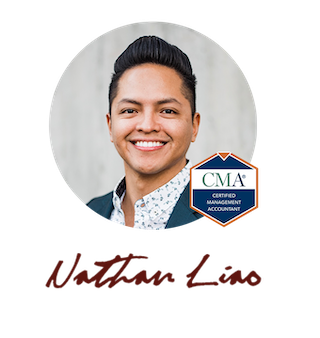
Hi, I’m Nathan Liao (aka the CMA Coach)! For the last 10 years, over 82,000 accounting and finance pros came knocking at my door seeking guidance and help. If you’re also aiming to conquer the CMA exam on your very first try—without wasting away time or money—you’ve found your ultimate guide. Dive in deeper to discover more about me and the dedicated team that powers CMA Exam Academy. Click here and let’s embark on this journey together!

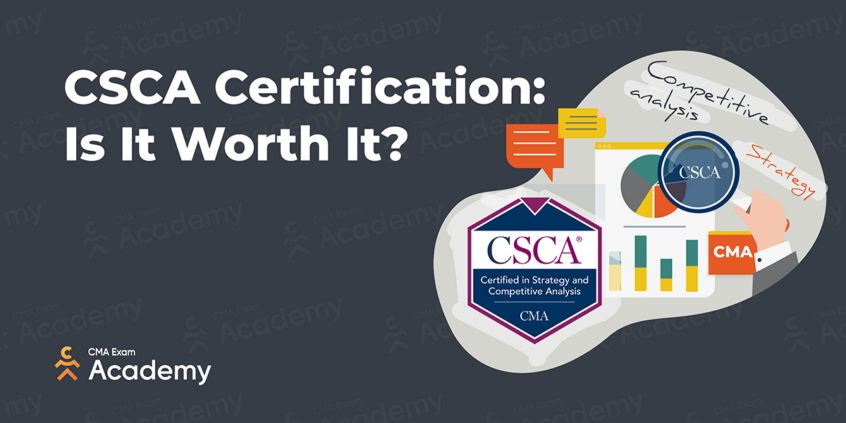
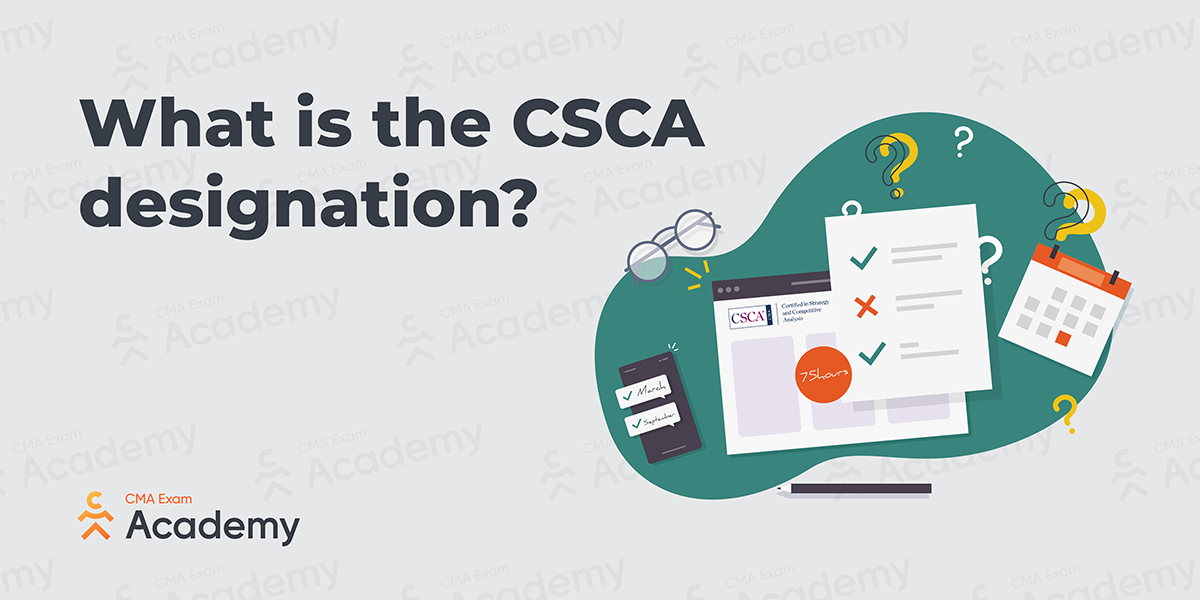
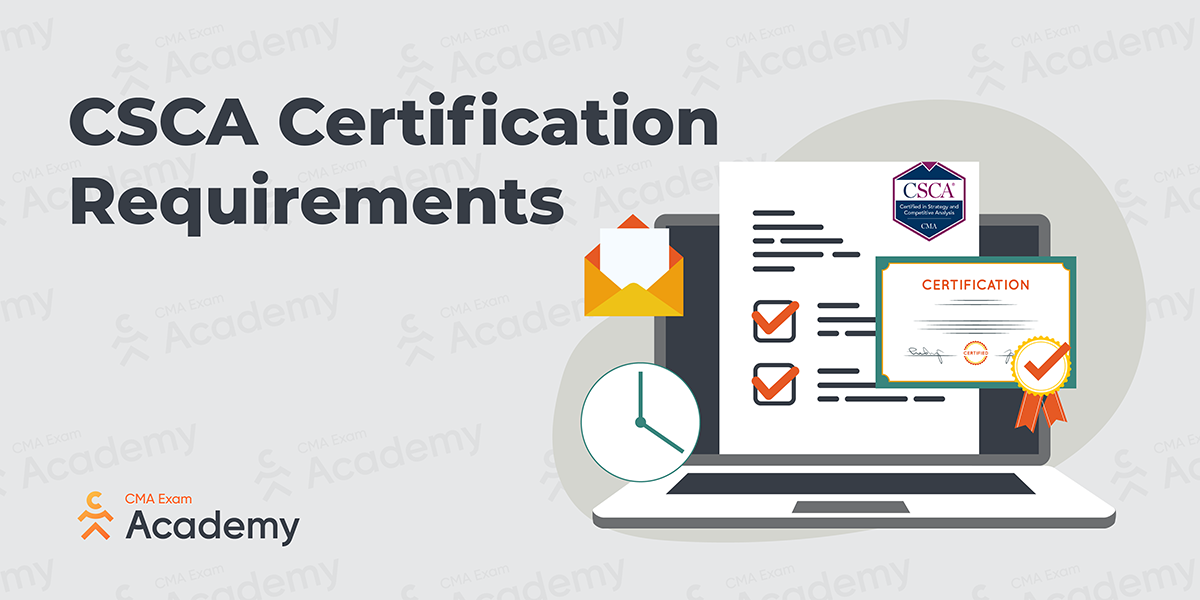
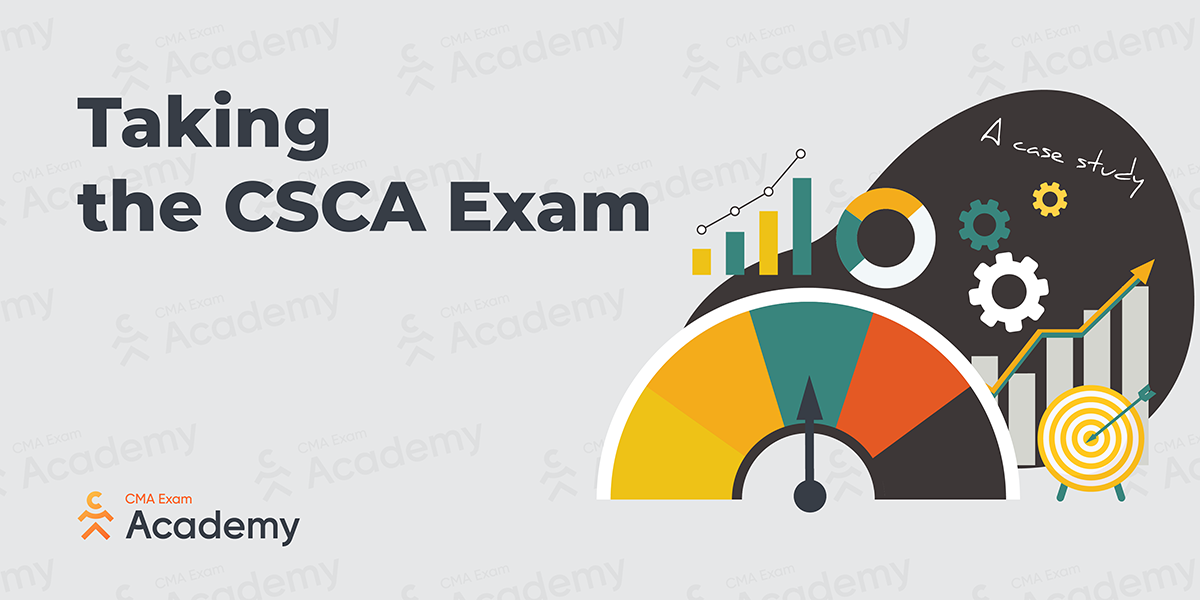
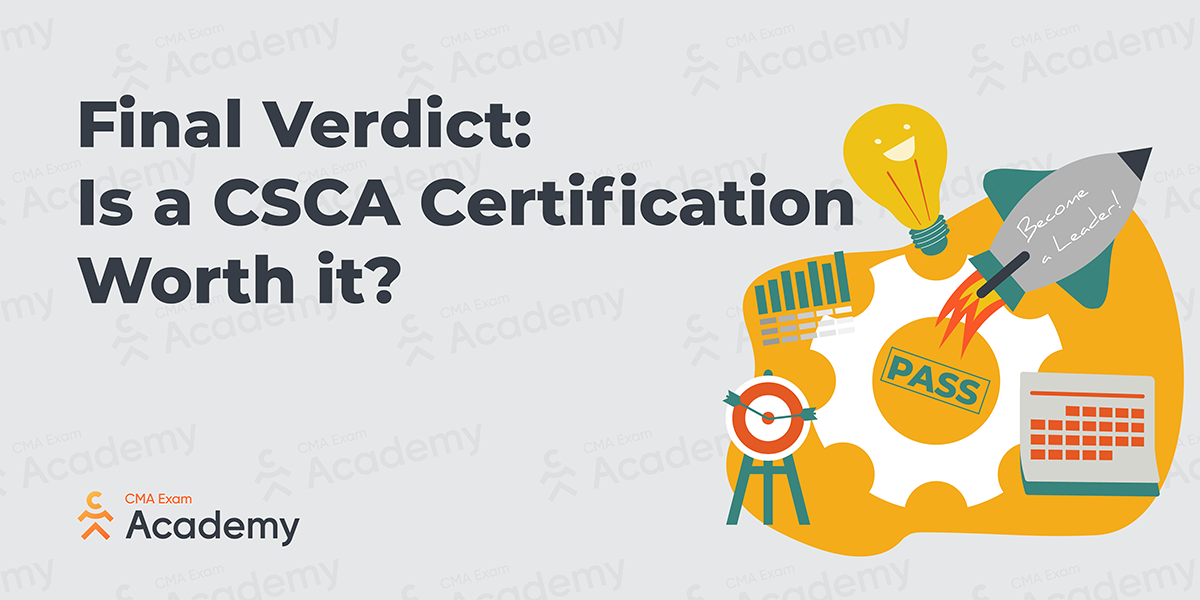
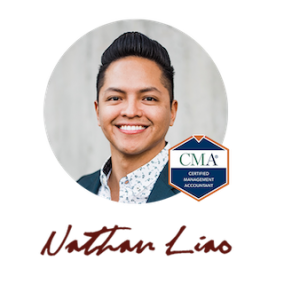
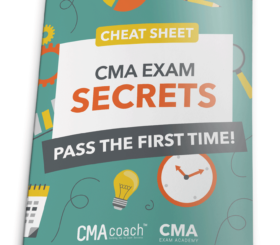
11 Comments on “CSCA Certification: Is It Worth It?”
Hi Nathan,
Thanks for the detailed info regarding the CSCA exam. Can you confirm the program costs for me because the IMA website shows different rates. I am an IMA member- qualified CMA. Is there any concession in it? Also, does IMA offer study materials?
Hi Vanessa,
he CSCA program cost varies based on your IMA membership status. Since you’re a qualified CMA, you may be eligible for a reduced rate. I recommend checking with IMA directly for the most accurate pricing.
Yes, IMA offers official study materials for the CSCA exam. You can find details on their website or contact them for more info.
hello
on CSCA Exam , I am wondering to know the marks allocation between multiple questions and the case study as part of 400 scores is the case study has 100 marks and 300 marks for the multiples?
Hi Khaled,
The marks for the exam are generally allocated between multiple-choice questions and case studies. The CSCA exam scores are scaled and will range from 0 to 400, with a passing score of 280.
The content on the CSCA exam will fall into three broad categories:
1. Strategic analysis, which counts for 25% of your grade
2. Creating competitive advantage, which counts for 40% of your grade
3. Strategy implementation and performance evaluation, which counts for 35% of your grade
For more in-depth information on the CSCA certification and how to prepare for the exam, check out additional tips and resources on IMA’s website.
Are there any prep classes or trainings available for Part 3?
Hi Valerie,
The CSCA is just one exam, not 3. Are you referring to a different CSCA credential perhaps?
I would like to know more bout the CSCA; do you provide study materials for the programme?
Hi Ansar,
I currently don’t have study material for the CSCA exam. I help professionals with the US CMA credential.
Please note that the IMA provides supplemental study material for candidates who register for the CSCA exam.
Thank you,
Dear Nathan Liao,
I appreciate that you value the comments and you reply properly on timely manner. keep up good support. I had a chance to go through your materials that are simple and disclosing unwanted fearness of CMA.
Thank you,
Ansar
Hi, do you also have a CSCA review course?
Hi Lizzie,
I’m offering CMA review courses for the US CMA exam only.
You can learn more about this designation in the following article: How to Become a CMA: 10 Steps to Getting Certified
Nathan